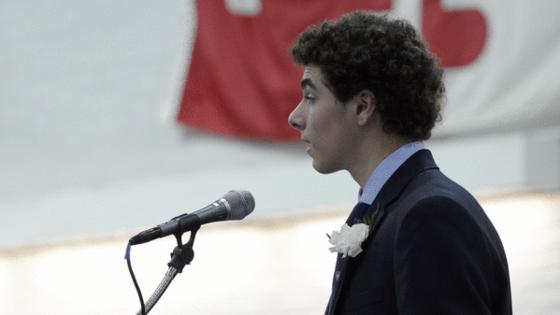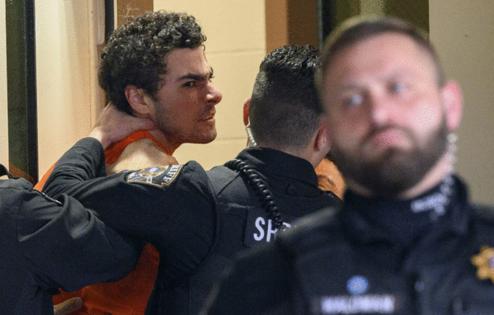Alleged CEO killer Luigi Mangione's privileged life may explain why he tried to get away with murder
Published in News & Features
TOWSON, Md. — The clean-cut streets outside Baltimore where Luigi Mangione grew up are a picture of suburban idyll: Tidy lawns, flowering bushes, stately Colonials and Capes in muted colors.
Mangione enjoyed all the trappings of that privilege. He went to the high-end Gilman private school where he became valedictorian, got into an Ivy League School and earned a master’s in computer science. He had every opportunity to make a difference.
But that stereotype was shattered with the caught-on video cold-blooded killing of UnitedHealthcare CEO Brian Thompson. And since Mangione’s arrest last week, a critical question has gone unanswered:
Why would someone with so much privilege and promise allegedly turn to cold-blooded murder to make his point?
Dr. Naftali Berrill, a forensic psychologist, said it’s not as uncommon as people might think for someone with Mangione’s history and resources to commit acts of violence.
“It’s that privilege that leads to a grandiose sense of self, a sense that they’re entitled to pursue a certain course of action. ‘I’m a hero. I’m so brazen, that I think I can shoot someone in broad daylight,” Dr. Berrill said.
Mangione, who grew up seemingly with everything, might have felt he had a “unique perspective,” and an ability to “outfox law enforcement” with his Ivy League education, Dr. Berrill speculated.
“There’s a grand delusion that to do this is OK because they’re serving a greater good. And that he’s so special that he’s so special that he wouldn’t get caught,” he added.
Five days after the Dec. 4 killing outside the Hilton hotel in Midtown, where Thompson was scheduled to speak, Mangione was spotted in a McDonald’s in Altoona, Pennsylvania. He is now in a Pennsylvania prison as he awaits extradition to NYC, where he will be tried on a charge of second-degree murder.
'Bright and kind soul'
Mangione’s paternal grandfather, Nicholas Mangione, built the family’s wealth as a real-estate developer after being born into poverty, the son of an Italian immigrant in Baltimore’s Little Italy, according to a 1995 profile in The Baltimore Sun.
One of 37 cousins, Mangione grew up in a modest Colonial home on the corner of Buckley Court near Chatterleigh Circle, a sleepy cul-de-sac in Towson where neighbors were stunned to hear the news.
“I couldn’t believe it,” one neighbor said. “I’m shocked.”
“I knew his parents. The parents were very nice people. They were pretty much to themselves. But very nice people,” he said. “They didn’t really socialize with the community to my knowledge. …They were well-off. You’d never know, they were down-to-earth people.”
His cousin, Nino Mangione, a GOP lawmaker who represents a suburban Baltimore district in the state’s House of Delegates, posted a statement from the family expressing their shock over the brutal slaying.
“Our family is shocked and devastated by Luigi’s arrest,” Nino Mangione posted on Facebook. “We offer our prayers to the family of Brian Thompson and we ask people to pray for all involved.”
A similar theme was picked up by many of his friends.
A high school friend, who wished to remain anonymous, told the Daily News he is “truly saddened and speechless” at the allegations, saying they don’t align with the Mangione he knew.
“Luigi Mangione was, is, and will continue to be loved by his friends, family, and everyone he came into contact with,” the friend said in a statement. “He is a bright and kind soul, motivated by a deep care for the world and improving it for everyone around him. He is a creator and scholar. I truly hope he will have a chance to speak for himself at the appropriate time because I have full confidence that his words are worth listening to.”
Other high school pals described him to the New York Times as intelligent and driven, “a big believer in the power of technology to change the world,” according to one of those friends, Aaron Cranston.
He graduated as valedictorian of the private all-boys Gilman School where he played soccer and ran track. He went to the University of Pennsylvania, earned a master’s degree in computer science, and co-founded a video game development lab at the Ivy League school.
According to a LinkedIn profile, after his internship, Mangione was a teaching assistant at the University of Pennsylvania in data structures and algorithms and also worked as a teaching assistant at Stanford University for a summer program in AI. Since graduation, Mangione had been working as a data engineer for TrueCar, a California-based online car marketplace, according to the LinkedIn profile.
Dr Louis Schlesinger, a professor of psychology at John Jay College of Criminal Justice said, the narrative has come to revolve around Mangione, instead of his victim, partly because of his background.
“The offender intrigues everybody because it’s the opposite of what you expect,” Schlesinger said. “He’s obviously intelligent, went to U Penn, his family is super wealthy, and it just doesn’t compute with average people.
“It’s not that we’re surprised. We’re intrigued because it flies in the face of what we think and what we hear.”
Health care anger
Cops are looking into an emergency room visit by Mangione, who suffered a back injury on July 4, 2023.
The visit is being investigated in connection with the alleged killer’s apparent animosity towards the health care industry. Investigators are monitoring his Facebook account, which was said to have highlighted the difficulties he went through as a result of the injury.
Michael TenEyck, an assistant professor of criminology at the University of Texas at Arlington said that while Magione had a lot going for him — attractiveness, a charming personality, wealth — that all may have been canceled out by his physical pain.
“If you wake up every day with back pain, it may not matter. Just mere discomfort every day might push someone over that edge,” TenEyck said.
R.J. Martin, who founded a co-living space called Surfbreak in Honolulu, where Mangione lived for six months, said Mangione told him he was suffering from a spinal misalignment, the Times reported.
A photo posted on X believed to belong to Mangione shows an x-ray of a spine with screws in it, and his Goodreads.com account included reviews of several books about back pain.
“He knew that dating and being physically intimate with his back condition wasn’t possible,” Martin told the Times. “I remember him telling me that, and my heart just breaks.”
At some point, Mangione became focused on the ills of the health care industry — a theme that has resonated with many following the saga across the nation.
Mangione’s now-taken-down Goodreads.com account offered a glimpse at the books he was reading and contemplating over the last year. Included in an online list of books he read this year is Unabomber Theodore Kaczynski’s “Industrial Society and its Future,” which Mangione rated four out of five stars.
“He was a violent individual — rightfully imprisoned — who maimed innocent people. While these actions tend to be characterized as those of a crazy luddite, however, they are more accurately seen as those of an extreme political revolutionary,” his review said.
“When all other forms of communication fail, violence is necessary to survive,” the post went on to say. “It’s not terrorism, it’s war and revolution.”
Mangione had a 260-word manifesto on him when he was arrested, which gave an apparent confession to the execution, police sources said. The note made clear he acted alone— and that while what he did “had to be done,” he’s sorry for the harm it caused.
“Frankly, these parasites had it coming,” police sources said he wrote.
Mangione also noted that people in the United States pay more in health care expenses than those in any other country but Americans’ life expectancy is ranked at No. 42 worldwide.
Dr. Berrill said his manifesto only furthers his point that Mangione may have had an inflated ego due to his background.
“I’m unique. I’m special. I’m entitled. It speaks to that grandiosity,” Dr. Berrill said.
Cops found the words “Deny,” “Delay,” and “Depose” written on the bullets — a supposed insurance industry mantra for delaying claims and maximizing profits — leading police to believe that the killer was, in fact, motivated by a beef with the insurance industry.
“The castings on the shell — that shows he put thought into it. It wasn’t a crime of passion,” said TenEyck.
Mental health concerns
Another key question, experts say, is whether Mangione was suffering from some sort of mental illness. There were several signs of potential instability in the months leading up the shooting.
Around six months ago, Mangione cut off contact with his friends and family, according to the Times. Mangione’s last known address is Honolulu, and also had connections to San Francisco, police said.
In January Mangione pleaded no contest to trespassing at Nu’uanu Pali Lookout, a public park in Kaneohe, Hawaii, and paid a $100 fine.
“He seems to be a very smart individual,” forensic psychologist, Dr. Alexis Reyes said, noting Mangione’s academic achievement, privilege, seemingly close family ties, and ability to remain employed.“
For the most part up until at least a few months ago,” she said. “That’s what we really want to pay attention to from a mental health aspect.”
“His mother had filed a missing person report six months ago. We start to feel this normally social individual become very isolated,” Reyes continued.
Schlesinger said there aren’t any clear answers about potential mental illness quite yet. Nothing has been raised in court.
“It’s more speculation based on no facts. We’re just going to have to wait, and even then, there are different degrees of mental illness. It’s way more complicated than what we can put in a sound bite,” he said.
Mangione lashed out as he arrived at court for a hearing on Tuesday about an “insult to the intelligence of the American people.”
Appearing clad in an orange jumpsuit, media crews captured Mangioni appearing to be upset, struggling with court security officers and yelling to members of the press in mostly inaudible statements, describing something as “completely out of touch” as officers slammed him up against a wall.
Manhattan psychiatrist, Dr. Gail Saltz, said Mangione’s arrest has garnered harsh reactions across the board.
“Many of us think that if we had what he has and where he came from, that we would protect all that, and not risk it, not do something like this,” Dr. Saltz said.
“It’s sort of a perfect storm here. It’s not just those things,” she said of Mangione’s apparent advantages in life. “It’s somebody planning and carrying out a murder in New York City in broad daylight of a CEO of a major company. It’s the audacity of the crime and who was killed.”
“It challenges our ideology as a society,” Dr. Reyes added.
“The reality is we are all humans. Just because he is a privileged individual who is better equipped doesn’t necessarily mean that is enough to prevent him or anyone from a similar background from acting in a similar way,” Reyes said.
©2024 New York Daily News. Visit nydailynews.com. Distributed by Tribune Content Agency, LLC.










Comments